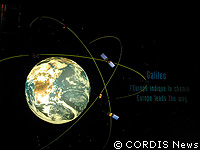Galileo expands to Ukraine
The EU and Ukraine held their first summit since the 'Orange Revolution' on 1 December, and meeting in Kiev, government leaders decided to extend the Ukraine-EU partnership to cover Europe's satellite radio navigation programme Galileo. The Galileo agreement creates a framework for cooperation in satellite navigation in a wide range of sectors, as well as the participation of the country in the Galileo management structures. The formal agreement was signed on 1 December in Kiev by Prime Minister Yuriy Yekhanurov for Ukraine, by Prime Minister Tony Blair on behalf of the EU Presidency, and by President José Manuel Barroso for the European Commission. Welcoming the decision, Vice-President Jacques Barrot, in charge of EU Transport policy said: 'Ukraine is one of the few countries that has developed a wide expertise in global satellite positioning technologies and its participation is an important step for the development of Galileo as an international programme.' The agreement also contains references to the extension of the European Geostationary Navigation Overlay Service (EGNOS) to Ukraine. Its geographical location makes the country particularly interesting as it allows the EU to extend the service to the former Soviet republics. Ukraine is one of a group of eight countries in the world with significant technological expertise in space programmes, and was previously involved in the development of global navigation satellite system (GNSS) applications and equipment. Indeed, its space industry is the world's leader in the design and production of launchers and GNSS components. The Ukrainian authorities are considering introducing GNSS technology in various modes of transport. The Galileo agreement with Ukraine confirms the European Union's ambition to further stimulate international cooperation. Ukraine is the fifth non-EU country to join the Galileo programme. Discussions are underway with Argentina, Brazil, Mexico, Norway, Chile, South Korea, Malaysia, Canada and Australia. The ever-growing interest of third countries wishing to participate represents considerable boost for the GNSS market, which is potentially considerable: 3 billion receivers and annual revenues of some 275 billion euro by 2020 worldwide, and the creation of more than 150 000 highly qualified jobs in Europe alone.
Countries
Ukraine



